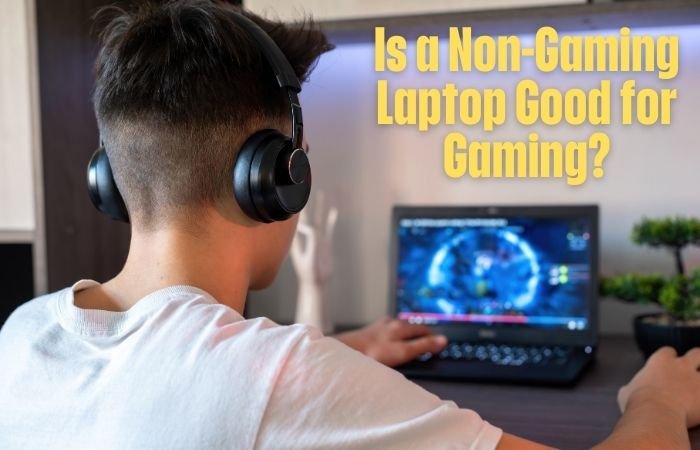When you think of gaming laptops, you probably imagine high-performance devices with powerful graphics cards and fast processors. Right? However, only some people need or can afford a high-end gaming laptop. So, Is a Non-Gaming Laptop Good for Gaming?
Well, the short answer is yes. However, there are some important factors to consider. It is true that non-gaming laptops often do not have all the features of a gaming laptop. But they can still offer a decent gaming experience especially for casual or less demanding games.
Here, we’ll go over the pros and cons of using a non-gaming laptop for gaming and if it’s a good option.
Is a Non-Gaming Laptop Good for Gaming?
So, If you’re thinking about gaming on a non-gaming laptop, you probably have doubts if it’s even possible. Although gaming laptops are built for performance, non-gaming laptops can also handle gaming to some extent.
But there are a few things you should keep in mind:
-
GPU And RAM Considaration:
Non-gaming laptops can work for gaming if they have powerful enough hardware. Choose a laptop with a fast processor, a lot of RAM, and a decent GPU (graphics processing unit).
Some laptops like the Asus ProArt StudioBook 16 or MSI Creator Z17 HX have good processors and ample RAM. Because of this, they can handle lighter games or lower settings in more demanding games.
-
Graphics Capabilities
GPUs (graphics cards) are essential when playing games. While non-gaming laptops might not have the best GPUs, some models have dedicated graphics cards.
For example, the Lenovo Slim Pro 9 comes with an NVIDIA GeForce RTX 4070 GPU. It can run modern games, though you may have to lower the settings to ensure smooth gameplay.
-
Display Quality
High-refresh-rate screens are common in gaming laptops, which provide a more enjoyable gaming experience. Non-gaming laptops, however, may not have these fast screens. While some non-gaming laptops have high-resolution OLED displays that are excellent for gaming.
-
Cooling and Thermal Management
One of the big challenges with gaming on a non-gaming laptop is heat. Gaming generates a lot of heat, and cooling systems are crucial for performance. Non-gaming laptops typically don’t have specialized cooling systems, which can lead to slower performance or overheating.
If you plan to game for extended periods, consider using an air conditioner pad to help manage temperatures and keep the laptop from throttling.
-
Portability and Battery Life
Compared to gaming laptops, non-gaming laptops are smaller, lighter and last longer. However, gaming can drain your battery quickly, so it’s always best to plug in while playing. If you prefer portability, a non-gaming laptop might be the better choice.
-
Affordability
If you’re on a budget, non-gaming laptops are generally cheaper than gaming laptops. Models like the MSI Creator Z17 HX provide a good balance of work and play without the high price tag of gaming laptops. For casual gaming or light gaming needs, a non-gaming laptop offers great value for money.
-
Software and Game Requirements
Non-gaming laptops can run most games just like gaming laptops. For best performance, adjust game settings like resolution and graphics quality.
Make sure your laptop meets the game’s minimum system requirements, especially for modern games. Generally, casual games or older titles run well, but AAA games might require lowered settings.
-
Gaming and multitasking experience
Many come with powerful processors that handle multiple tasks at once. If you stream or chat while gaming, an Intel Core i9 high-performance laptop will help. When playing, it’s best to keep other tasks to a minimum, as running too many programs at once can impact performance.
Pros and Cons of Using a Non-gaming Laptop for Gaming
Let’s look at this table comparing the pros and cons of using a non-gaming laptop for gaming:
| Pros | Cons |
| Cheaper than gaming laptops. | Lower GPU performance for demanding games. |
| Lighter and easier to carry. | Less efficient heat management during gaming. |
| Longer-lasting for daily use. | May require lowered graphics for smooth play. |
| Strong CPUs handle work and gaming together. | Few upgrade opportunities for long-term gaming. |
| Works well for less demanding games. | Lacks gaming-specific features (e.g., high-refresh-rate displays). |
| Typically quieter than gaming laptops. | Missing extras like RGB lighting or gaming ports. |
| Uses less power for basic tasks. | rmance in modern, resource-heavy games. |
Final Touch
While non-gaming laptops can handle gaming, they come with certain limitations. If you’re looking for an affordable option for light gaming or casual play, a non-gaming laptop can work. But you’ll need to manage your expectations, especially when it comes to performance and cooling. If you are serious about gaming, you should invest in a dedicated gaming laptop.
